

Spaghetti injunction: Pastafarianism is not a religion, Dutch court rules. The Dutch council of state has ruled that Pastafarianism is not a religion, denying a follower of the Church of the Flying Spaghetti Monster the right to wear a colander on her head in her passport and driving licence photo.
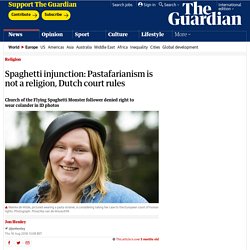
Mienke de Wilde is now considering taking her case to the European court of human rights. The Netherlands’ highest court said de Wilde, a law student from Nijmegen, could not be exempted on religious grounds from a ban on headwear in official identity photographs, because Pastfarianism was essentially a satire and not a serious faith. WHY STUDY RELIGION. Would we be better off without religion? Is religion a force of good or evil?
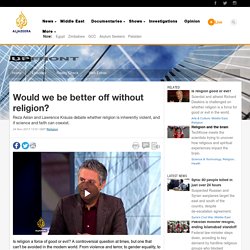
A controversial question at times, but one that can't be avoided in the modern world. From violence and terror, to gender equality, to science, reason, and education - the faithful and the faithless tend to repeatedly clash over whether religion is a net positive or negative, whether it helps humanity more than it hurts it.
Scientists Find Religion Triggers Same Area of Brain as Sex, Drugs and Love. Religious and spiritual experiences have profound effects on many people around the world.
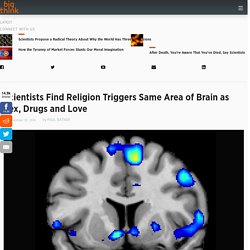
A new study from a team of neuroscientists shows that what they feel is caused by activating the brain’s reward circuits that control our ability to feel pleasure. It’s the part of the brain associated with sex, drugs, music as well as love. "We're just beginning to understand how the brain participates in experiences that believers interpret as spiritual, divine or transcendent," said Jeff Anderson, M.D., Ph.D. from the University of Utah School of Medicine, senior author of the study and neuroradiologist. ”In the last few years, brain imaging technologies have matured in ways that are letting us approach questions that have been around for millennia. " To figure out how the brain processes spiritual feelings, the scientists focused their attention on a group of 19 church-going Mormons (12 males and 7 females - all former missionaries). What is the historical evidence that Jesus Christ lived and died?
How confident can we be that Jesus Christ actually lived?
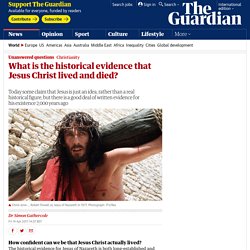
The historical evidence for Jesus of Nazareth is both long-established and widespread. Within a few decades of his supposed lifetime, he is mentioned by Jewish and Roman historians, as well as by dozens of Christian writings. Compare that with, for example, King Arthur, who supposedly lived around AD500. The major historical source for events of that time does not even mention Arthur, and he is first referred to 300 or 400 years after he is supposed to have lived. The evidence for Jesus is not limited to later folklore, as are accounts of Arthur. What do Christian writings tell us? TED - Why do people join cults? A crash course in how...
Religion for Atheists: 5 Religious Concepts That Atheists Can Use. Probably the most boring question you can ask about religion is whether or not the whole thing is ‘true’.
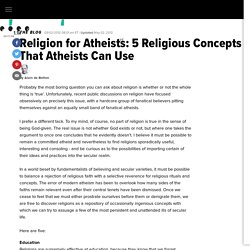
Unfortunately, recent public discussions on religion have focused obsessively on precisely this issue, with a hardcore group of fanatical believers pitting themselves against an equally small band of fanatical atheists. I prefer a different tack. To my mind, of course, no part of religion is true in the sense of being God-given. The real issue is not whether God exists or not, but where one takes the argument to once one concludes that he evidently doesn’t. Does Everything Happen for a Reason? - The New York Times. Who Is to Blame for the Greatest Myth in the History of Science and Religion? These Two Guys.
Highly religious people see little conflict with science. The finding sounds, at first, like a head-scratcher: “Highly religious Americans are less likely than others to see conflict between faith and science.”
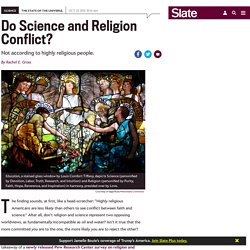
After all, don’t religion and science represent two opposing worldviews, as fundamentally incompatible as oil and water? Isn’t it true that the more committed you are to the one, the more likely you are to reject the other? Well, no. And if you believe that, you’re probably not religious. Why Are There No New Major Religions? - The Atlantic. Cipinang prison stands like a huge fortress in East Jakarta, its massive walls and guard towers separating the city’s bustling traffic from the criminals held within its gates.
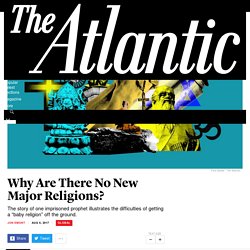
I visited in March, sitting at a noisy mess hall filled with hardened, tattooed Indonesian prisoners who greeted their wives and children with hugs and pats on the head. The prison is known for housing many of the country’s most notorious drug criminals and convicted terrorists. But across from me sat a trio of prisoners in bright orange fatigues charged with a different crime entirely: daring to start a new religious movement.
The leader of the group, Ahmad Mushaddeq, a broad-shouldered man with bright gray eyes and a winning smile, is a former national badminton coach turned preacher. Religion has no monopoly on transcendent experience. In 1969, the British writer Philip Pullman was walking down the Charing Cross Road in London, when his consciousness abruptly shifted.
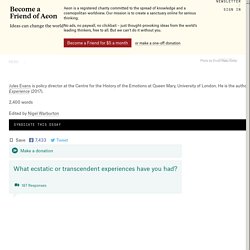
It appeared to him that ‘everything was connected by similarities and correspondences and echoes’. The author of the fantasy trilogy His Dark Materials (1995-2000) wasn’t on drugs, although he had been reading a lot of books on Renaissance magic. But he told me he believes that his insight was valid, and that ‘my consciousness was temporarily altered, so that I was able to see things that are normally beyond the range of routine ordinary perception’. He had a deep sense that the Universe is ‘alive, conscious and full of purpose’. Why religion is not going away and science will not destroy it.
In 1966, just over 50 years ago, the distinguished Canadian-born anthropologist Anthony Wallace confidently predicted the global demise of religion at the hands of an advancing science: ‘belief in supernatural powers is doomed to die out, all over the world, as a result of the increasing adequacy and diffusion of scientific knowledge’.
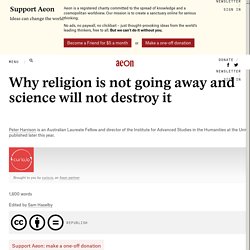
Wallace’s vision was not exceptional. On the contrary, the modern social sciences, which took shape in 19th-century western Europe, took their own recent historical experience of secularisation as a universal model. An assumption lay at the core of the social sciences, either presuming or sometimes predicting that all cultures would eventually converge on something roughly approximating secular, Western, liberal democracy. Has Physics Made Philosophy and Religion Obsolete? - The Atlantic. Andersen: I want to start with a general question about the relationship between philosophy and physics.
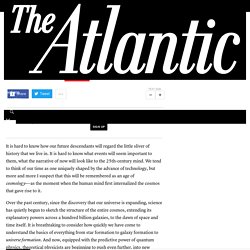
A brief history of religion in art - TED-Ed. It's perfectly human to grapple with questions, like ‘Where do we come from?’ And ‘How do I live a life of meaning?’ These existential questions are central to the five major world religions -- and that’s not all that connects these faiths. John Bellaimey explains the intertwined histories and cultures of Hinduism, Judaism, Buddhism, Christianity and Islam. The one thing the New Atheists get right about religion.
Lamb. The Meat More People Can Eat. Science and Religion. Real Time with Bill Maher: Ben Affleck, Sam Harris and Bill Maher Debate Radical Islam (HBO) Kwame Anthony Appiah: Is religion good or bad? (This is a trick question) Economist. Many of today’s hottest arguments about religious freedom involve idiosyncratic micro-communities which impose on themselves (and on their children) norms of life which the rest of society finds bizarre or worse. That is one reason why a polygamy trial which recently opened in the Canadian province of British Columbia has attracted attention throughout the country and among law-and-religion pundits across the world. The trial focuses on a fundamentalist religious community called “Bountiful”. The group is home to Canada’s best-known avowed polygamist, Winston Blackmore, as well as his former brother-in-law James Oler. Both have been charged with polygamy under legislation which has existed for more than a century but has proved virtually impossible to apply because of countervailing considerations about religious freedom.
"Bountiful", which was founded in 1946, has its roots in offshoots from the American Mormon church whose mainstream leadership eschewed polygamy in 1890. Religion Could Be More Durable Than We Thought. Pedestrians walk past St. Patrick's Cathedral in New York City. The number of Americans who list their church affiliation as "none" has certainly increased, but more than 70 percent still identify generally as Christian. Marianne O'Leary/Flickr hide caption. Just How Much Is Sports Fandom Like Religion? - The Atlantic. Pro sports teams are like what religion and sociology scholars call "totems"—symbols of greater entities that communities gather around for identity and unity. Two San Diego fans perform the sacred ceremonial Chargers face-painting ritual before a game in 2011.
(AP / Denis Poroy) Religious Knowledge Systems - Embler's TOK. TOK-a-journey - Religious Knowledge Systems.